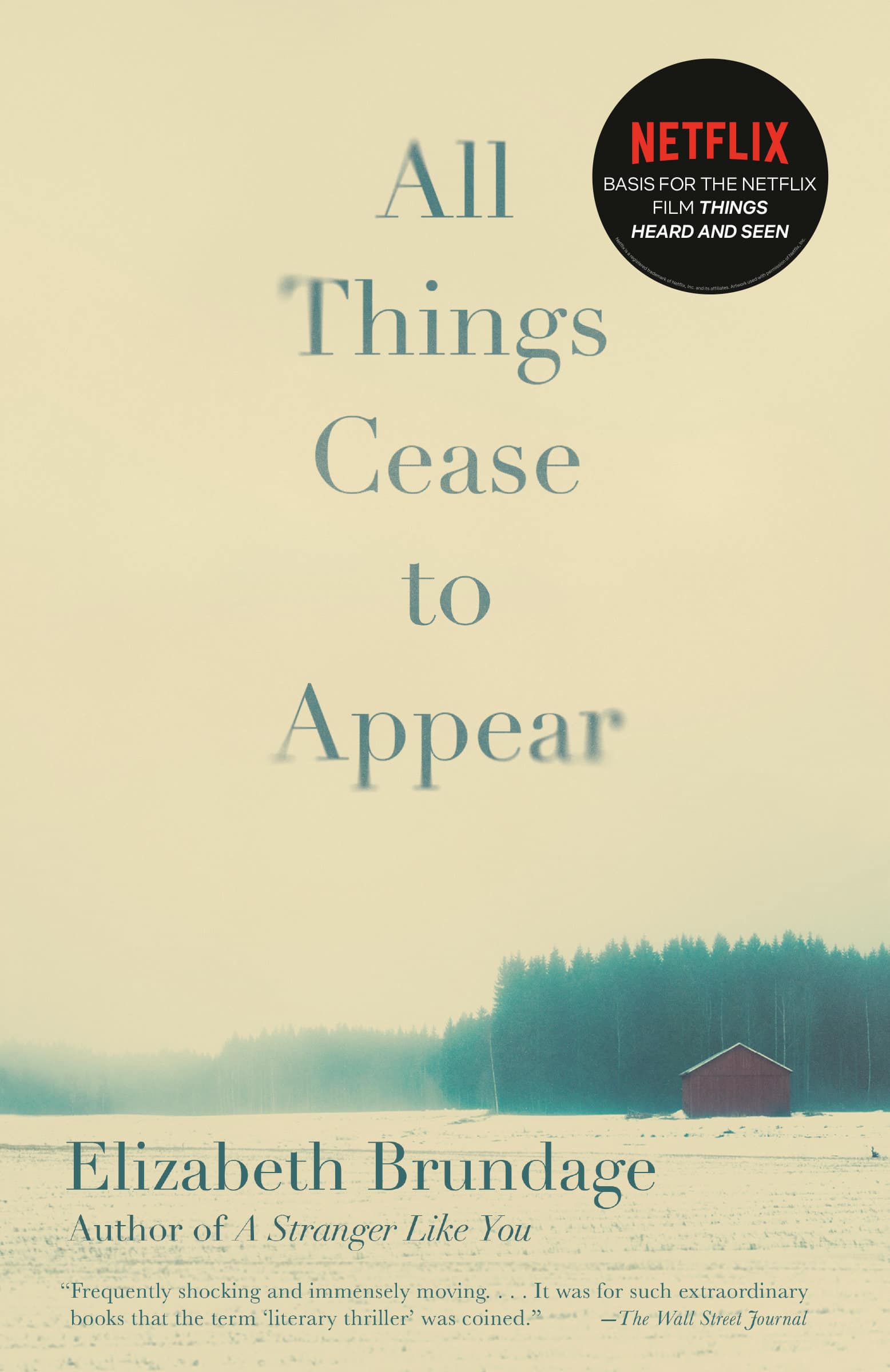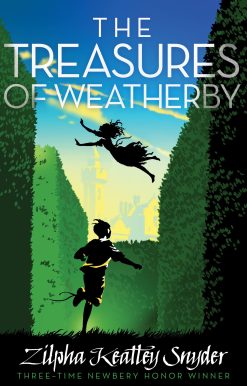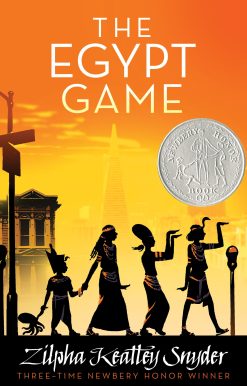All Things Cease to Appear
17.00 JOD
Please allow 2 – 5 weeks for delivery of this item
Description
“This literary thriller’s complex narrative involves a cursed house, an unsolved murder and impeccable writing.” —The New York Times Book Review • The basis for the Netflix film Things Heard and Seen Recent transplants to the small town of Chosen, New York, the Clares have not received the warmest welcome; once a thriving dairy farm, their home is haunted by the tragedy that left the former owner’s three sons orphaned and adrift. Late one winter afternoon, professor George Clare knocks on his neighbor’s door with terrible news: he returned from work to find his wife, Catherine, murdered in their bed. Someone took an ax to her head while their three-year-old daughter, Franny, played alone in her room across the hall. As one dark secret peels away to reveal others—and as the Clare marriage reveals itself to have a sinister darkness that rivals the farm’s history—Elizabeth Brundage offers a rich and complex portrait of the scars that can haunt a community for generations and the dark longings inside each and every one of us that drive us to do inexplicable things.
Additional information
| Weight | 0.323475 kg |
|---|---|
| Dimensions | 2.54 × 13.081 × 20.32 cm |
| by | |
| Format | Paperback |
| Language | |
| Publisher | |
| Year Published | 2017-2-7 |
| Imprint | |
| Publication City/Country | USA |
| ISBN 10 | 1101911484 |
| About The Author | ELIZABETH BRUNDAGE graduated from Hampshire College, attended NYU film school, was a screenwriting fellow at the American Film Institute in Los Angeles, and received an MFA as well as a James Michener Award from the University of Iowa Writers’ Workshop. She has taught at a variety of colleges and universities, most recently at Skidmore College, where she was visiting writer-in-residence. She lives near Albany in upstate New York. http://www.elizabethbrundage.com |
“Frequently shocking and immensely moving…. It was for such extraordinary books that the term ‘literary thriller’ was coined.” —The Wall Street Journal “Ghosts, murder, a terrifying psychotic who seems normal, and beautiful writing. Loved it.” —Stephen King “This literary thriller's complex narrative involves a cursed house, an unsolved murder and impeccable writing.” —The New York Times Book Review, Editor’s Choice “A beautifully written treat … as much a disturbing portrait of family and town life as it is a provocative mystery.” —Elle “Superb…. Think a more literary, and feminist, Gone Girl. As the seemingly perfect marriage at its core reminds us, the most lethal deceptions are the stories we tell ourselves.” —Vogue“As terrifyingly unsettling—and as beautiful—as cracking ice over a raging river. Part murder mystery, part ghost story, All Things Cease to Appear is also a profound look at how past guilt informs the present, how what we yearn for is not always what we get, and how it’s not only houses that can be haunted, but people as well. One of the most ambitious, original and gorgeously written novels that I’ve ever read—and been unable to forget.” —Caroline Leavitt, author of Cruel, Beautiful World “A classic murder mystery [combined] with a gripping psychological thriller, exploring the complexities of grief, relationships—romantic, familial and friendly—and small-town life.” —BookPage “With a storyline that tightens like a constrictor, this is a book that you won’t want to read alone at night.” —Kirkus Reviews (starred review) “[A] dark, chilling drama.” —Entertainment Weekly “All Things Cease to Appear is a riveting ghost story, psychological thriller, and literary page turner. . . . At its heart, this is a story about women’s grit and courage, will and intelligence. It’s a powerful and beautiful novel.” —Kate Christensen, author of The Astral “Exquisitely gut-churning…. Brundage’s language is the real draw, with her vivid portraits of spouses on opposite sides of a brutal abyss.” —Time “At once high art and a spellbinding thriller, this is a book of many wonders, including a character as creepily sinister as any created by Patricia Highsmith.” —Beverly Lowry, author of Harriet Tubman: Imagining a Life “Insightful, evocative.” —People, “Book of the Week” “Transcendent . . . Tragedy leaves an indelible mark on both people and places in Brundage’s piercing new novel. Party mystery, part ghost story, and entirely brilliant.” —Library Journal “Spellbinding.” —The Anniston Star “Slightly Gothic, socially perceptive, and briskly written.” —New York magazine “[A] dark, chilling drama.” —Entertainment Weekly “Brundage’s searing, intricate novel epitomizes the best of the literary thriller. . . . Succeeding as murder mystery, ghost tale, family drama, and love story, her novel is both tragic and transcendent.” —Publishers Weekly “A dynamic portrait of a young woman coming into her own [and] of a marriage in free fall.” —Booklist (starred review) “I bloody loved this. . . . Beneath the daisies and farmhouses, the drinks parties and local dramas, something grand, tense and terrifying is shifting, between men and women, between townies and newcomers, between adults and children.” —Louisa Young, author of My Dear, I Wanted to Tell You |
|
| Excerpt From Book | February 23, 1979Again, it was snowing. Half past five in the afternoon. Almost dark. She had just laid out their plates when the dogs started barking.Her husband set down his fork and knife, none too pleased to have his supper interrupted. What’s that now?June Pratt pulled aside the curtain and saw their neighbor. He was standing there in the snow, holding the child, her feet bare, neither of them in coats. From the looks of it, the little girl was in her pajamas. It’s George Clare, she said.What’s he selling?I wonder. I don’t see a car. They must’ve come on foot.Awful cold out. You better see what he wants.She let them in with the cold. He stood before her, holding the child out like an offering.It’s my wife. She’s—-Momma hurt, the child cried.June didn’t have children of her own, but she had raised dogs her whole life and saw the same dark knowing in the child’s eyes that confirmed what all animals understood, that the world was full of evil and beyond comprehension.You’d better call the police, she told her husband. Something’s happened to his wife.Joe pulled off his napkin and went to the phone.Let’s go find you some socks, she said, and took the child from her father and carried her down the hall to the bedroom where she set her on the bed. Earlier that afternoon, she had laid her freshly laundered socks over the radiator, and she took a pair now and pushed the warm wool over the child’s feet, thinking that if the child were hers she’d love her better.They were the Clares. They had bought the Hale place that summer, and now winter had come and there were just the two houses on the road and she hadn’t seen them much. Sometimes in the morning she would. Either when he raced past in his little car to the college. Or when the wife took the child out of doors. Sometimes, at night, when June walked the dogs, you could see inside their house. She could see them having supper, the little girl between them at the table, the woman getting up and sitting down and getting up again.With the snow, it took over a half–hour for the sheriff to arrive. June was vaguely aware, as women often are of men who desire them, that Travis Lawton, who had been her classmate in high school, found her attractive. That was of no consequence now, but you don’t easily forget the people you grew up with, and she made a point of listening carefully to him, and acknowledged his kindness to George, even though there was the possibility, in her own mind at least, that the bad thing that had happened to his wife might have been his own doing.he was thinking of Emerson, the terrible aristocracy that is in Nature. Because there were things in this world you couldn’t control. And because even now he was thinking of her. Even now, with his wife lying dead in that house.He could hear Joe Pratt on the phone.George waited on the green couch, shaking a little. Their house smelled like dogs and he could hear them barking out back in their pens. He wondered how they could stand it. He stared at the wide boards, a funk of mildew coming up from the cellar. He could feel it in the back of his throat. He coughed.They’re on their way, Pratt said from the kitchen.George nodded.Down the hall, June Pratt was talking to his daughter with the sweet tone people use on children and he was grateful for it, so much so that his eyes teared a little. She was known for taking in strays. He’d see her walking the road with the motley pack at her side, a middle–aged woman in a red kerchief, frowning at the ground.After a while, he couldn’t say how long, a car pulled up.Here they are now, Pratt said.It was Travis Lawton who came in. George, he said, but didn’t shake his hand.Hello, Travis.Chosen was a small town and they were acquaintances of a sort. He knew Lawton had gone to RPI and had come back out here to be sheriff, and it always struck George that for an educated man he was pretty shallow. But then George wasn’t the best judge of character and, as he was continually reminded by a coterie of concerned individuals, his opinion didn’t amount to much. George and his wife were newcomers. The locals took at least a hundred years to accept the fact that somebody else was living in a house that had, for generations, belonged to a single family whose sob stories were now part of the local mythology. He didn’t know these people and they certainly didn’t know him, but in those few minutes, as he stood there in the Pratts’ living room in his wrinkled khakis and crooked tie, with a distant, watery look in his eyes that could easily be construed as madness, all their suspicions were confirmed.Let’s go take a look, Lawton said.They left Franny with the Pratts and went up the road, him and Lawton and Lawton’s undersheriff, Wiley Burke. It was dark now. They walked with grave purpose, a brutal chill under their feet.The house sat there grinning.They stood a minute looking up at it and then went in through the screened porch, a clutter of snowshoes and tennis rackets and wayward leaves, to the kitchen door. He showed Lawton the broken glass. They climbed the stairs in their dirty boots. The door to their bedroom was shut; he couldn’t remember shutting it. He guessed that he had.I can’t go in there, he told the sheriff.All right. Lawton touched his shoulder in a fatherly way. You stay right here.Lawton and his partner pushed through the door. Faintly, he heard sirens. Their shrill cries made him weak.He waited in the hall, trying not to move. Then Lawton came out, bracing himself against the doorjamb. He looked at George warily. That your ax?George nodded. From the barn. |
Only logged in customers who have purchased this product may leave a review.






Reviews
There are no reviews yet.